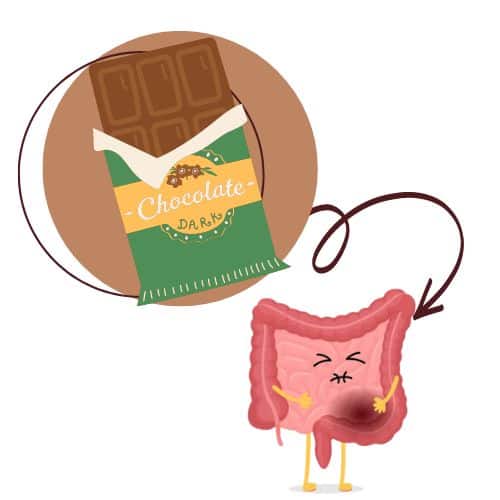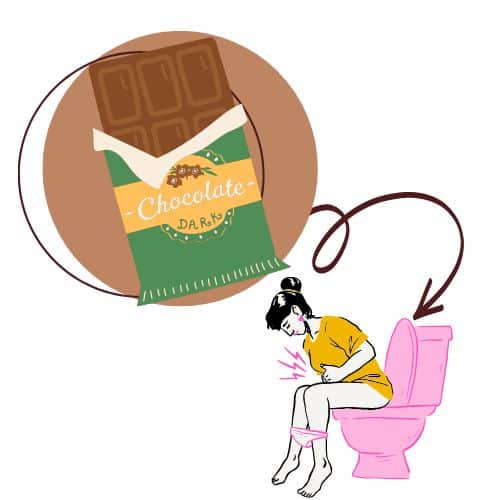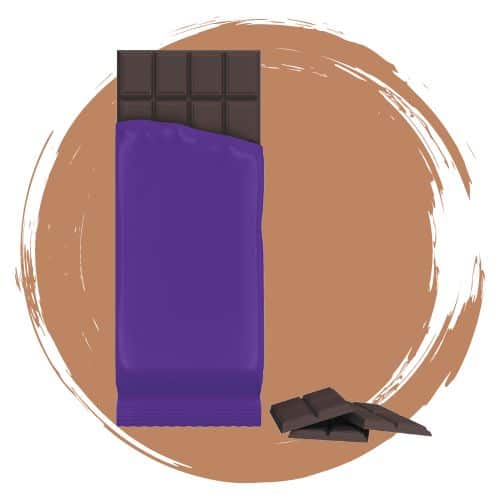Does chocolate affect bowel movements? Yes, a high amount of chocolate consumption can trigger abdominal pain and digestive problems. You may face difficulties in stool passing. It’s better to consume chocolate in moderate amounts.
Do you love chocolate but sometimes doubt that it’s messing up with your stomach? Does it affect bowel movements?

If you are obsessed with chocolate and are ready to take a bite whenever you see it, yes, it may make your digestive system uncomfortable. You will experience bloating, gas, or abdominal pain.
This article will explore the link between chocolate and bowel movements. We will also discuss different types of chocolates and their effects on the digestive system. So, if you’re curious about the connection between chocolate and bowel movements, read on!
What Are Bowel Movements?

Bowel movements, or BM’s, refer to the passing of stool from the intestines. This movement can be regular or irregular and is often accompanied by abdominal pain or discomfort.
The frequency of bowel movements depends on many factors, such as diet, lifestyle, medication, and age. Illness like IBS (irritable bowel syndrome) can also affect Bowel movements.
A normal bowel movement should be easy to pass and occur several times daily. If your bowel movements are too frequent, painful, or difficult to pass, it may indicate a problem.
Do Chocolate Affect Bowel Movements?

Chocolate contains certain compounds that can mildly affect the digestive system.
Caffeine and other stimulants in chocolate can cause changes in the normal pattern of bowel movements, resulting in either constipation or diarrhea.
Eating a large amount of chocolate may overwhelm your digestive system and cause abdominal cramps, bloating gas, nausea, and other symptoms.
Studies have also shown that chocolate contains small amounts of fiber which can stimulate peristalsis (the muscular contractions that move food through the digestive tract). This can help to increase transit time and soften stools, promoting regular bowel movements or constipation.
However, chocolate is high in sugar and fat, which can cause constipation. Eating a large number of sugary treats may make you feel temporarily full, but it won’t provide enough bulk or fiber to help digestion. This can lead to irregularity, bloating, and other digestive issues.
In general, chocolate, in moderation, is unlikely to affect your bowel movements significantly. But it’s important to be mindful of the amount of sugar and fat you’re consuming when eating chocolate so that it doesn’t cause digestive distress.
Eating a balanced diet, including plenty of fiber-rich foods like fruits, vegetables, and whole grains, can help ensure you get the nutrients you need for optimal digestive health.
The Role Of Chocolate In Our Diet

Chocolate may not be a necessary part of our diets, but there are still plenty of reasons why it can be beneficial. Chocolate contains antioxidants that can help reduce inflammation in the body and protect against certain diseases.
The flavonoids in chocolate have been linked to lower blood pressure and improved heart health, while other compounds in cocoa beans – like caffeine and theobromine – can help boost energy.
But there is a downside to chocolate consumption, especially when it comes to our digestive health.
Studies have suggested that chocolate can be a trigger for irritable bowel syndrome (IBS) and other gastrointestinal issues. This is because chocolate contains compounds like methylxanthines which may act as laxatives in the body and affect the speed of digestion.
It’s important to note that the effects of chocolate on bowel movements will vary from person to person.
Some people may experience few or no side effects, while others may find that consuming even small amounts of chocolate can lead to uncomfortable digestive symptoms.
Different Types Of Chocolate And Its Effect On Bowel Movements
1. Dark Chocolate

Dark chocolate is the least likely type of chocolate to affect your bowel movements. It contains less sugar, more cocoa solids, and a higher percentage of antioxidants than other forms, such as milk or white chocolate.
As long as you are mindful of your portion size when eating dark chocolate, it’s not likely to cause any digestive distress.
2. Milk And White Chocolates

Milk and white chocolates contain more sugar than dark chocolate and can potentially affect your digestion. While these types may be enjoyed in moderation, it’s important to consider how much sugar you are consuming when enjoying them.
Additionally, these types of chocolates do not provide much fiber, which is necessary for healthy digestion.
3. Plain Or Regular Chocolate

Chocolate-containing products such as cookies, cakes, and ice cream also contain added sugar and calories, which can cause digestive problems.
Eating these types of foods in excess can lead to an increase in bloating, gas, and constipation.
4. Cocoa Powder

Cocoa powder, or pure chocolate in its powdered form, is the least processed of all chocolates. It has a higher concentration of flavonoids and antioxidants than other forms of chocolates and can be part of a healthy diet as long as it is consumed in moderation.
5. Unsweetened Or Baking Chocolate

Unsweetened or baked chocolate contains higher concentrations of theobromine and caffeine, which are stimulants. Overconsumption can lead to an increase in heart rate and blood pressure levels as well as an increase in bowel movements.
It is important to note that these effects also vary from person to person.
How Much Chocolate Does It Take To Affect Bowel Movements?

The amount of chocolate needed to affect bowel movements varies widely. Generally, a small amount of chocolate may not affect the frequency or consistency of one’s bowel movements.
However, consuming larger amounts, especially if it is in the form of unsweetened or baked chocolate, can increase the chances of it having an effect.
As a rule of thumb, it is recommended that people consume no more than 50 grams of chocolate per day to avoid any adverse effects.
Does Chocolate Also Affect Stool Consistency?

The type of chocolate you consume may affect your stool consistency.
Darker, richer chocolates, such as baking or semi-sweet varieties, contain more fat and are harder to digest. This can lead to the formation of softer stools which can be more difficult to pass. In contrast, milk chocolates contain less fat and are easier to digest, resulting in firmer stools.
How Can You Reduce the Effects of Chocolate on Bowel Movements?

If you’re concerned about the effects that your diet may have on your bowel movements, there are some measures that you can take to reduce any unwanted effects:
- Try reducing the amount of chocolate consumed in a day and limiting it to no more than 50 grams.
- Opt for dark chocolate over milk varieties, and be sure to drink plenty of water throughout the day.
- Ensure you keep up with a balanced diet full of fiber-rich foods such as fruits and vegetables, which can help regulate your bowel movements.
Frequently Asked Questions (FAQs)
How does chocolate affect your bowels?
Chocolate can have a laxative effect on the bowels, leading to runny stools or diarrhea. Dark chocolate is generally better tolerated than milk chocolate, so you should opt for dark varieties if possible.
Does chocolate help bowel movements?
Yes, chocolate can also help regulate bowel movements due to its fiber content. Just make sure not to go overboard with chocolate consumption, as it can still lead to unpleasant side effects.
Is chocolate good for the colon?
Chocolate is not necessarily good for the colon, as it can cause problems with digestion and increase the risk of constipation. However, some studies have found that dark chocolate can benefit the colon due to its high antioxidants, which help fight inflammation and reduce oxidative stress.
Does chocolate cause constipation or diarrhea?
Chocolate can cause constipation and diarrhea, depending on the individual’s reaction. Some people find that eating chocolate causes constipation due to its high-fat content, while others find that it causes diarrhea due to its high sugar content.
Does chocolate slow digestion?
Yes, chocolate can slow digestion, as it is high in fat and sugar. This can lead to a feeling of fullness for longer periods of time and can affect the speed at which food moves through the digestive system. Furthermore, chocolate also contains caffeine, which can act as a stimulant and increase gastric acid production, further slowing down digestion.
Now, It’s Your Turn!
In the end, chocolate does have some effects on bowel movements. Eating large amounts of chocolate can lead to constipation and other digestive issues.
However, small amounts of dark chocolate can actually help with digestion, as it is known for its laxative effects. Although chocolate may affect your digestion, eating it in moderation should not cause any negative health effects. Have you ever experienced any stomach inconsistency after eating lots of chocolate?
